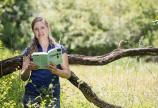Geography students engage in virtual climate summit
- Anne MacLaurin

How can countries collaborate to reduce global emissions? UVic geography students have been discovering for themselves that international collaboration to save the planet is actually quite difficult - especially in a virtual climate summit. Although their classroom work was only a simulation of the problems facing governmental leaders, students enrolled in “Global Environmental Change and Human Response” felt the pressures and problems faced by policy makers as the world collectively strives to avoid reaching dangerous climate change thresholds.
The role-play scenario was led by geography instructor Sophia Carodenuto who explains, “in my teaching, I challenge students by simulating real-world situations where they have to think on their feet, and here, they put those feet in the shoes of some of the most critical decision makers of our time—global climate change negotiators.”
The virtual role-playing exercise allowed students to explore the necessary speed and action required for nations to address global climate change. The class had to work together to reach a global agreement that kept climate change below 2°C.
During the exercise, students tested their knowledge of global politics and experimented with a climate-modeling tool used by actual climate negotiators.

The simulated climate negotiations was truly an eye-opening experience for me. I really appreciated the experience. While frustrating, disheartening and slightly terrifying, it truly gave me so much more understanding of how difficult it must be for these powerful individuals to do their jobs.
—Claire Gilmour, UVic geography student
“The world climate simulation taught the students how to explain current trends in global environmental change and demonstrate the relationship among the issues,” says Carodenuto.
Given the need for strict social distancing to curb the spread of COVID-19, explains Carodenuto, many high-level political meetings such as the United Nations Conference of Parties have been switched to online formats.
Carodenuto’s students are essentially mimicking the challenges of using communication technology to negotiate targets to reduce greenhouse gas emissions and pledge funding to adapt to climate change.
“Based on the feedback received over the years,” says Carodenuto, “students highly value this experiential learning opportunity, including through Zoom.”



